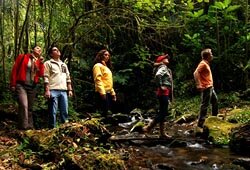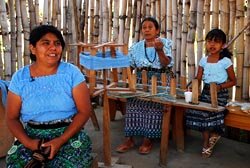

Sustainable Tourism
Be a Sustainable Traveler!
Why choose to travel sustainably? Because your travel choices make a difference. By choosing sustainable businesses – like those listed on SustainableTrip.org - you will support businesses that conserve natural resources, protect plants and wildlife, and contribute to the well-being of local communities. You will also help to ensure that these treasures will also be there for future generations to enjoy.
What is Sustainable Tourism?

Sustainable tourism businesses are those that are profitable while conserving natural resources and benefitting local communities. Examples of best management practices include conserving water and energy, supporting community conservation projects, preserving cultural heritage, recycling and treating wastes, and sourcing locally-produced products in restaurants and gift shops. Sustainable businesses also hire employees from neighboring towns, pay them just wages, and offer them additional training. Visit the Rainforest Alliance’s SmartLodge to learn more about how hotels implement sustainable practices.
To learn more about the sustainable tourism practices of the business you would like to visit, check out the “Making A Difference” section available on all SustainableTrip.org profiles.
How Do I Know if a Business is Sustainable?
Many tourism businesses claim to be "green" or "eco-friendly" – but what does that really mean? How can you know if these businesses are really environmentally and socially responsible?
Many hotels, tour operators, and other businesses have demonstrated their commitment to sustainability by participating in a sustainable tourism certification or verification program. This means that they have been audited by an independent, third-party program and have met a vigorous set of environmental, social, and economic criteria.
Through SustainableTrip.org, the Rainforest Alliance is pleased to provide you with a list of these responsible businesses. We have strict guidelines for participation - all of the hotels, tour operators, and other businesses listed on SustainableTrip.org must be certified by a sustainable tourism certification program or verified by the Rainforest Alliance. If a business is located in a country that does not have a certification program available or where the Rainforest Alliance is not working, we accept recommendations by reputable organizations, such as established conservation organizations.
The sustainability claim of each business is confirmed by our staff before it is included on the site, so you can be assured that all of the businesses on SustainableTrip.org are taking concrete actions to conserve natural resources and support local communities.
How Can You Make A Difference?
At the hotel: Ask about environmental policies and practices. Does the hotel support community development or conservation projects?
Language: Learn a few words of the local language and use them.
Dress: Learn about local conventions and dress appropriately. In many countries, modest dress is important.
Behavior: Be respectful of local citizens' privacy. Ask permission before entering sacred places, homes, or private lands.
Photographs: Be sensitive to when and where you take photos/video of people. Always ask first.

Environment: Respect the natural environment. Never touch or harass wildlife. Always follow designated trails. Support conservation by paying entrance fees to parks and protected sites or making a donation.
Wildlife or forest products: Never purchase crafts, clothing, furniture, or other products that are derived from protected or endangered wildlife or plant species. In many countries it is illegal to bring these goods back home.
Pay a fair price: Don't engage in overly aggressive bargaining for souvenirs. Don't short-change on tips for services.
Buy local: Choose locally-owned lodges and hotels. Use local buses, car rental agencies, and airlines. Eat in local restaurants, shop in local markets, and attend local events.
Hire local guides: Enrich your experience and support the local economy. Ask guides if they are licensed and live nearby. Are they recommended by tour operators?
The Rainforest Alliance, an international conservation organization, helps the tourism industry protect the environment and provide sustainable livelihoods, builds travelers demand for sustainable tourism and enables them to travel responsibly, and promotes internationally sound standards for sustainable tourism.
